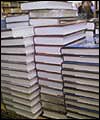 |
The
more you read, the more you will extend your vocabulary and develop
your reading skills. Wherever possible, choose books or articles
or extracts which are of interest to you, ones that motivate you
and encourage you to read on. Make sure they are at your level,
or only marginally above your level, neither too difficult nor too
easy.
Rather
than working with word lists, I think it is usually best to encounter
new words in context. Then you will see how they are used and how
you can use them yourself. As you come across new words in context,
there is a very good chance that you will be able to guess their
meaning. Let's suppose for a moment that you have not come across
the verb oversleep before. It's highly likely that you'll
be able to work out its meaning from this sentence:
- I overslept this morning. I usually wake up at seven, but
this morning I didn't wake up till nine.?
|
